Edward Alternatives
This guide compares 10 alternatives to Edward. We analyze each tool's features and pricing to help you find the best fit for your company.

Edward is a popular AI sales assistant that many teams use to save time on tasks like lead follow-up and sales forecasting. The tool is secure and performs well for these specific sales activities, which makes it a justified choice for some users.
However, like any tool, it has limits. Some users find issues with ease of use and reliability, which prompts them to seek alternatives. We've analyzed the best options based on G2 reviews to help you choose. Let's get started.
Consider 11x for Your Sales Team
Teams interested in digital workers for sales can consider 11x. It provides autonomous AI agents that handle complex sales tasks. This approach may be a good fit for organizations that want to augment their sales operations with specialized digital support.
11x is a GTM platform that uses AI agents to manage the sales process. Its agent, Alice, finds high-intent prospects, runs outreach on email and LinkedIn, and keeps the CRM up to date. A second agent, Julian, qualifies inbound leads and books meetings. The platform unifies data enrichment, outreach, and email warmup, replacing separate point solutions.
Edward Alternatives
Here, we examine the top alternatives to Edward in detail. Each review breaks down pricing, core features, and how the tool's strengths and weaknesses stack up against Edward.
1) Gong
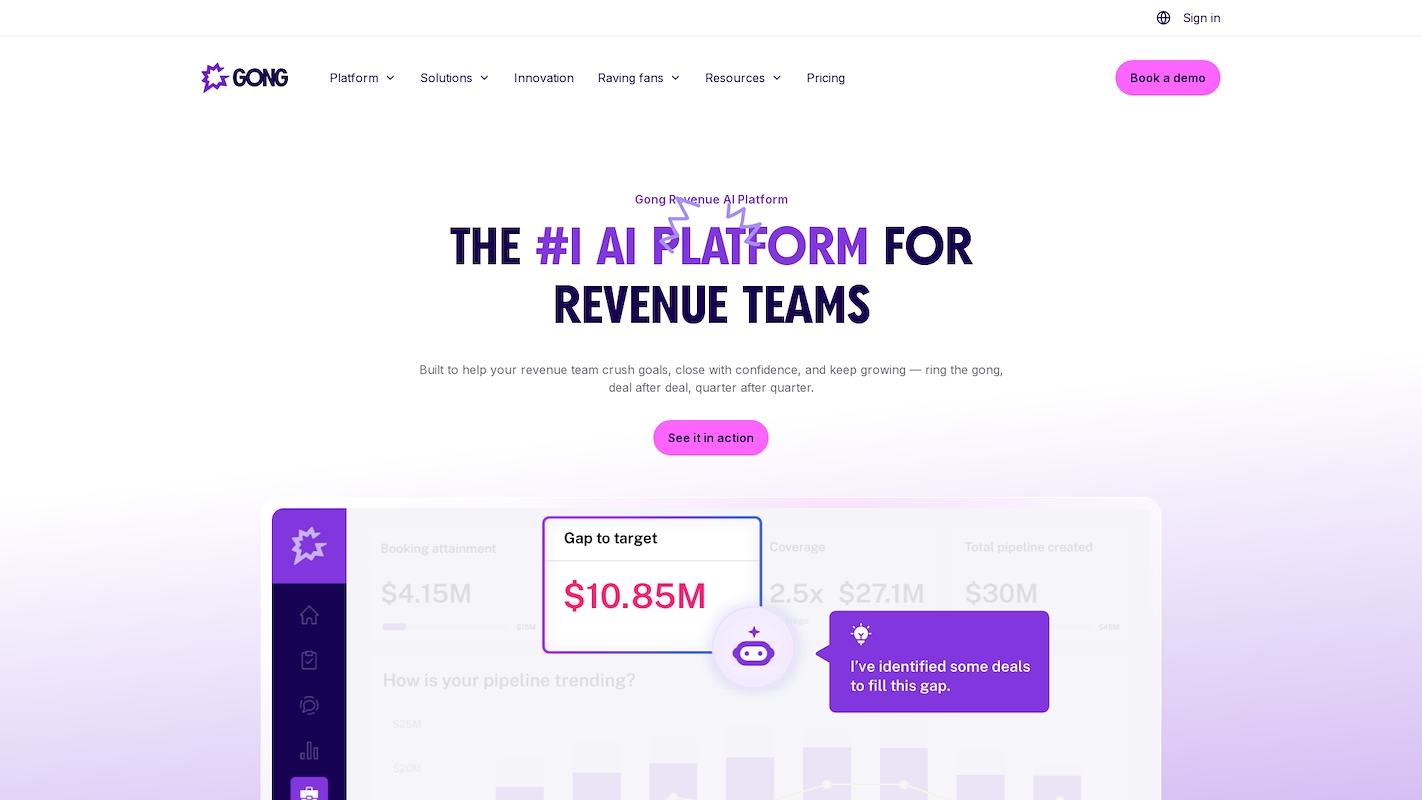
Gong is a revenue-AI platform that centralizes customer interactions and CRM data into a single workspace. It uses AI agents to automate tasks and support deal execution, pipeline management, and sales engagement at scale.
More than 4,500 companies, including brands like Google and LinkedIn, rely on Gong to manage their revenue workflows.
Gong's Main Features
- Centralizes customer interactions and CRM data into a single workspace for analysis.
- Records and transcribes calls to extract insights for coaching and pipeline health analysis.
- Automates data capture, mapping, and cleansing to enrich CRM records.
- Uses over 12 domain-specific AI agents to automate tasks and suggest next actions.
How Gong Compares to Edward
Average Review score: 4.8/5 stars based on 6,247 G2 reviews.
- Gong records and analyzes customer calls to provide deep insights. This is different from Edward, which primarily automates follow-up tasks and does not analyze conversation content.
- The platform includes sales coaching tools like scorecards and feedback mechanisms. These tools use data from actual sales calls to help managers train their teams, a feature not present in Edward.
- It centralizes all customer interactions, including calls and emails, into one place. This gives a more complete view of the customer journey compared to Edward's focus on specific sales activities.
- Its AI agents automate a broad range of revenue tasks. This scope is wider than Edward's, which concentrates on lead follow-up and forecasting.
Where Gong Falls Short Compared To Edward
- Gong focuses on analyzing customer conversations. It does not provide the specialized, automated lead follow-up sequences that are a core function of Edward.
- Some users report occasional problems with call recording or transcription accuracy. This can sometimes impact the reliability of insights from customer conversations.
- The tool's broad feature set can lead to a higher cost and a more complex implementation compared to Edward's more focused approach.
- Its AI-generated summaries sometimes require manual verification for complete accuracy. This is different from Edward, which automates more defined tasks like sending follow-up emails.
Cost Considerations
Gong does not publicly list its pricing, instead using a quote-based model, which is similar to Edward's approach. For the most accurate pricing, we recommend visiting Gong's official website to contact their sales team.
2) Chorus by ZoomInfo
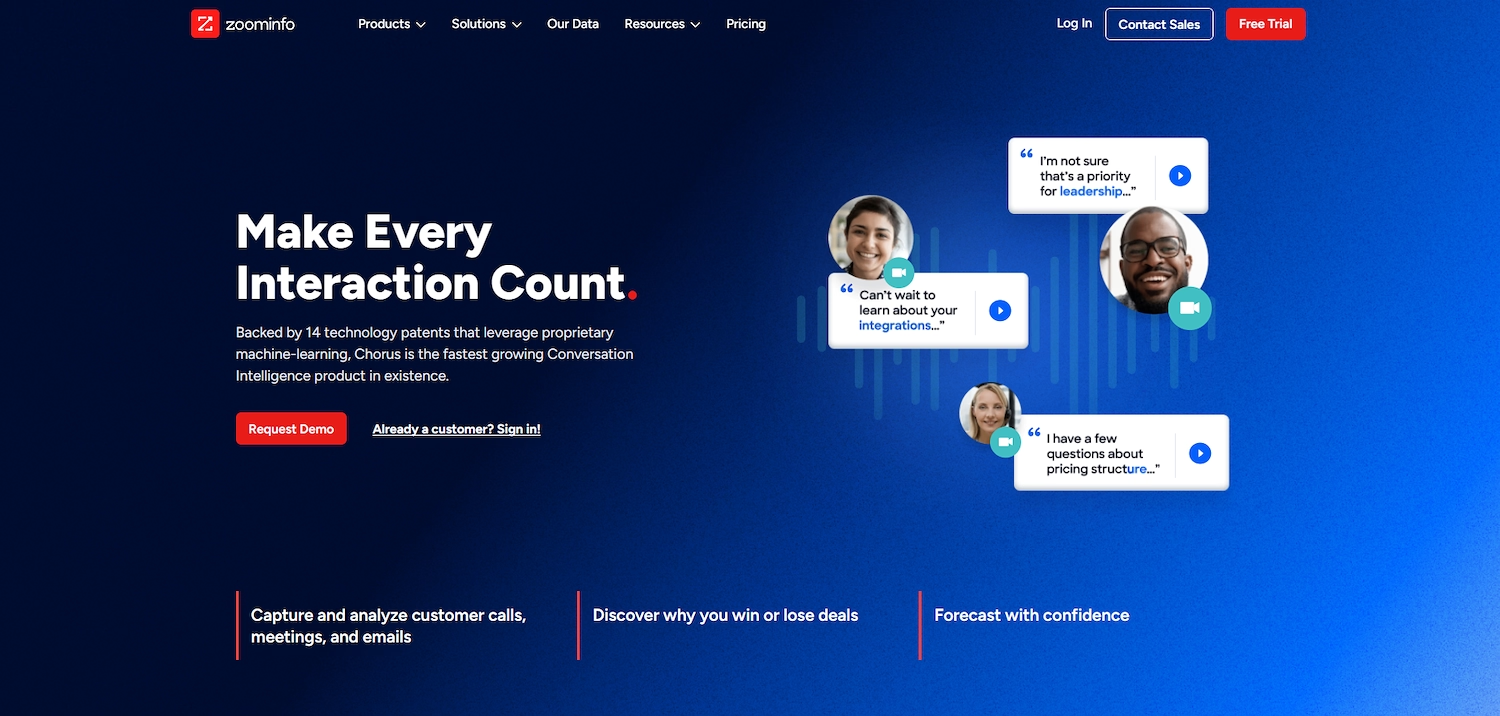
Chorus by ZoomInfo is a conversation intelligence platform that records, transcribes, and analyzes customer calls, meetings, and emails. It gives revenue teams visibility into buyer conversations to understand deal outcomes, coach representatives, and improve forecasts. The platform uses 14 proprietary machine-learning patents for its analysis.
Integrated ZoomInfo company and contact data enriches each conversation. This allows teams to see complete relationship histories and plan smarter outreach.
Chorus by ZoomInfo's Main Features
- Records calls in real time and provides automatic transcriptions for review and analysis.
- Uses AI to analyze conversations for topics discussed, competitor mentions, and talk-time ratios.
- Provides deal intelligence by automatically capturing communications, syncing to the CRM, and identifying deal momentum.
- Aggregates voice-of-the-customer data to identify market trends and inform product strategy.
How Chorus by ZoomInfo Compares to Edward
Average Review score: 4.5/5 stars based on 2,972 G2 reviews.
- Chorus by ZoomInfo provides detailed analysis of customer calls, including topics discussed and talk-time ratios. This differs from Edward, which automates follow-up sequences but does not analyze the content of conversations.
- It offers sales coaching tools, such as scorecards, based on call data to help train representatives. This is a feature not found in Edward, which centers on lead management.
- The platform generates AI summaries of meetings, which allows sales teams to focus on the conversation instead of taking notes. Edward automates different tasks, like forecasting, and does not offer this function.
- This tool aggregates data from all customer conversations to identify broader market trends. This provides a strategic overview that is different from Edward's focus on individual sales activities and follow-ups.
Where Chorus by ZoomInfo Falls Short
- Chorus by ZoomInfo focuses on conversation analysis. It does not provide the automated lead follow-up sequences that are a core function in Edward, which handles outreach tasks for sales teams.
- The platform does not offer a dedicated sales forecasting tool. This is different from Edward, which includes forecasting capabilities to help teams predict future sales performance.
- Some users note that AI-generated summaries occasionally lack sufficient detail. This may require manual review, which is different from Edward's focus on more structured, automated tasks.
Cost Considerations
Similar to Edward, Chorus by ZoomInfo uses a custom quote-based pricing model and does not list prices publicly. User reviews suggest a high perceived cost for the platform; for a precise quote, contact their sales team through the Chorus by ZoomInfo's official website.
3) Clari Copilot
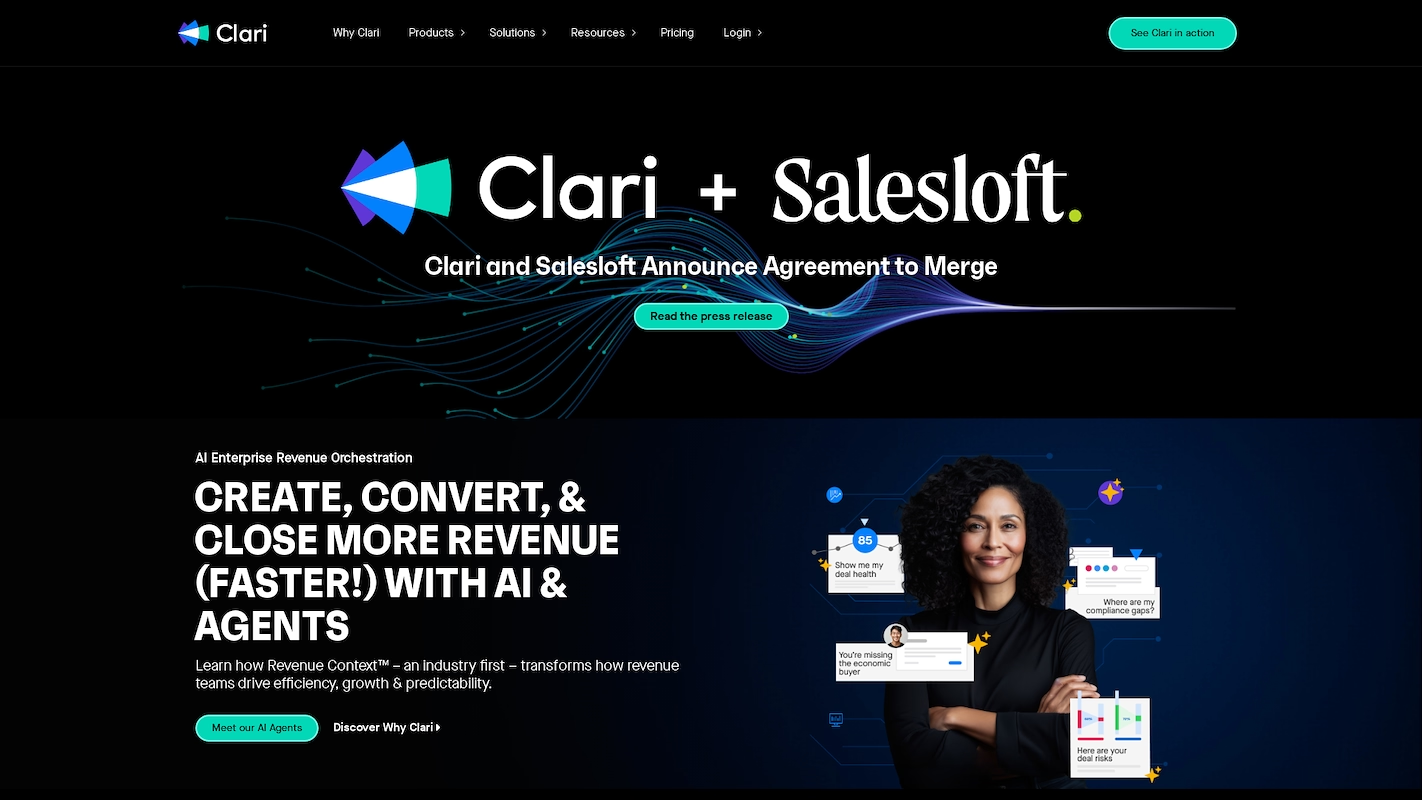
Clari Copilot is a conversational intelligence solution that offers real-time guidance during customer calls. It analyzes live conversations to help sellers seize important moments and scale practices to close deals. Insights flow into Clari’s Revenue Platform and the customer’s CRM.
This provides a full view of every deal. The tool automates tasks like call summaries and battlecard creation, which removes the need for manual notes.
Clari Copilot's Main Features
- Provides instant, in-call guidance to prompt sellers during important moments in a conversation.
- Automatically generates battlecards, call summaries, and next-step actions using its RevAI engine.
- Records, transcribes, and analyzes every meeting to identify actionable insights for revenue teams.
- Allows managers and representatives to bookmark key moments, add notes, and share snippets from calls.
How Clari Copilot Compares to Edward
Average Review score: 4.6/5 stars based on 5,464 G2 reviews.
- Clari Copilot offers real-time guidance during sales calls to help sellers with prompts. This is different from Edward, which automates tasks after the call, like follow-ups.
- The tool automatically creates call summaries and battlecards from conversations. This removes the need for manual note-taking, a task not automated by Edward.
- It uses predictive analytics to score opportunities based on conversation data. This provides a deeper level of insight compared to Edward's more general sales forecasting.
- This solution provides live pipeline management that updates with insights from every call. This offers a more dynamic view of the sales pipeline than Edward's forecasting, which is not tied to live conversation analysis.
Where Clari Copilot Falls Short Compared To Edward
- Clari Copilot analyzes sales calls but does not automate lead follow-up sequences. This is a primary function in Edward, which is designed to handle outreach tasks for sales teams.
- The tool's automation creates call summaries and battlecards from conversations. It does not manage the multi-step outreach campaigns that Edward automates to nurture leads over time.
- Its functionality is part of a larger revenue platform, which can mean a more complex setup. Edward, in contrast, provides a more focused solution for specific sales activities.
Cost Considerations
Like Edward, Clari Copilot uses a quote-based pricing model and does not publish its prices. User reviews indicate a high perceived cost for the platform. For the most accurate information, we recommend visiting Clari Copilot's official website to request a custom quote.
4) People.ai
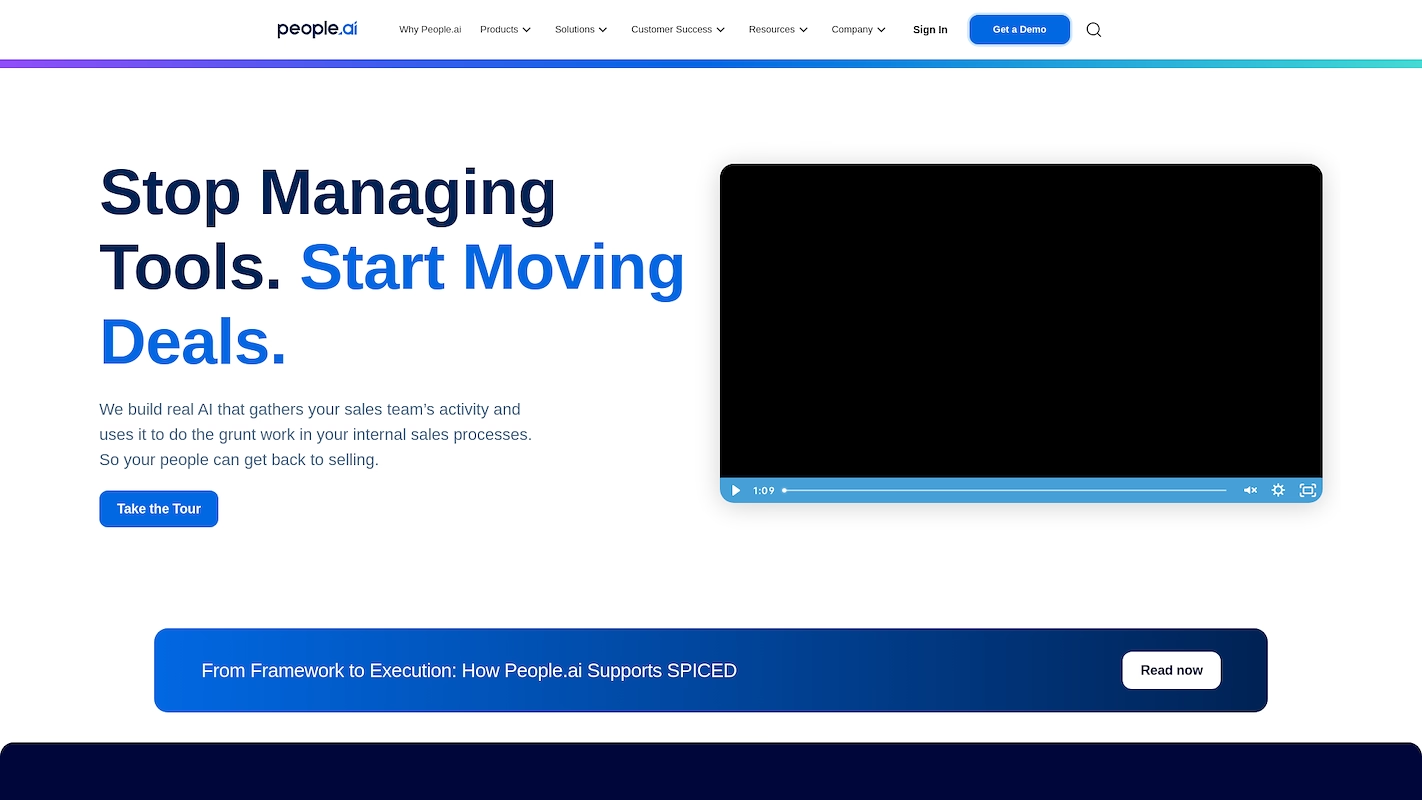
People.ai is a Revenue Intelligence and Operations platform for sales, marketing, and customer success teams. It captures all customer contacts, activity, and engagement to find revenue opportunities and provide insights for go-to-market motions.
For sales productivity, the platform automates manual data entry and activity logs. This process gives representatives more time to sell instead of handling CRM data entry.
People.ai's Main Features
- Captures over 1.8 million sales activities per hour and consolidates the data across all go-to-market tools.
- Generates automated, data-backed account plans to align pre-sale, post-sale, and renewal teams.
- Offers a free tool, PeopleGlass, that provides a single-view interface for representatives to update CRM records.
How People.ai Compares to Edward
Average Review score: 4.4/5 stars based on 463 G2 reviews.
- People.ai automatically captures all sales activities, which reduces manual data entry for representatives. This is different from Edward, which focuses on automating lead follow-up tasks.
- The tool creates data-backed account plans to align sales and renewal teams. Edward provides sales forecasting but does not generate these types of strategic account plans.
- It consolidates customer data from various go-to-market tools into one place. This provides a more complete view of engagement compared to Edward's focus on specific follow-up activities.
- This platform provides account-level insights by analyzing all captured engagement data. This offers a deeper analytical function than Edward's automated follow-up and forecasting features.
Where People.ai Falls Short Compared To Edward
- People.ai captures sales activity but does not automate lead follow-up sequences. This is different from Edward, which manages multi-step outreach campaigns to nurture prospects over time.
- The platform does not offer a dedicated sales forecasting feature. This contrasts with Edward, which includes a specific tool to help teams predict future sales performance based on their pipeline.
- Its focus on broad revenue intelligence can be a drawback for teams that need a simple tool for specific tasks. Edward provides a more targeted solution for lead follow-up, which may be easier to implement for that single purpose.
- Some users note that the tool sometimes fails to capture activities from all sources, such as LinkedIn or physical meetings. This can lead to incomplete data, which is different from Edward's more defined scope on email-based follow-ups.
Cost Considerations
People.ai uses a quote-based pricing model, similar to Edward, and does not publish its prices. User reviews indicate a high perceived cost, so for the most accurate information, we recommend visiting People.ai's official website to request a custom quote.
5) Drift
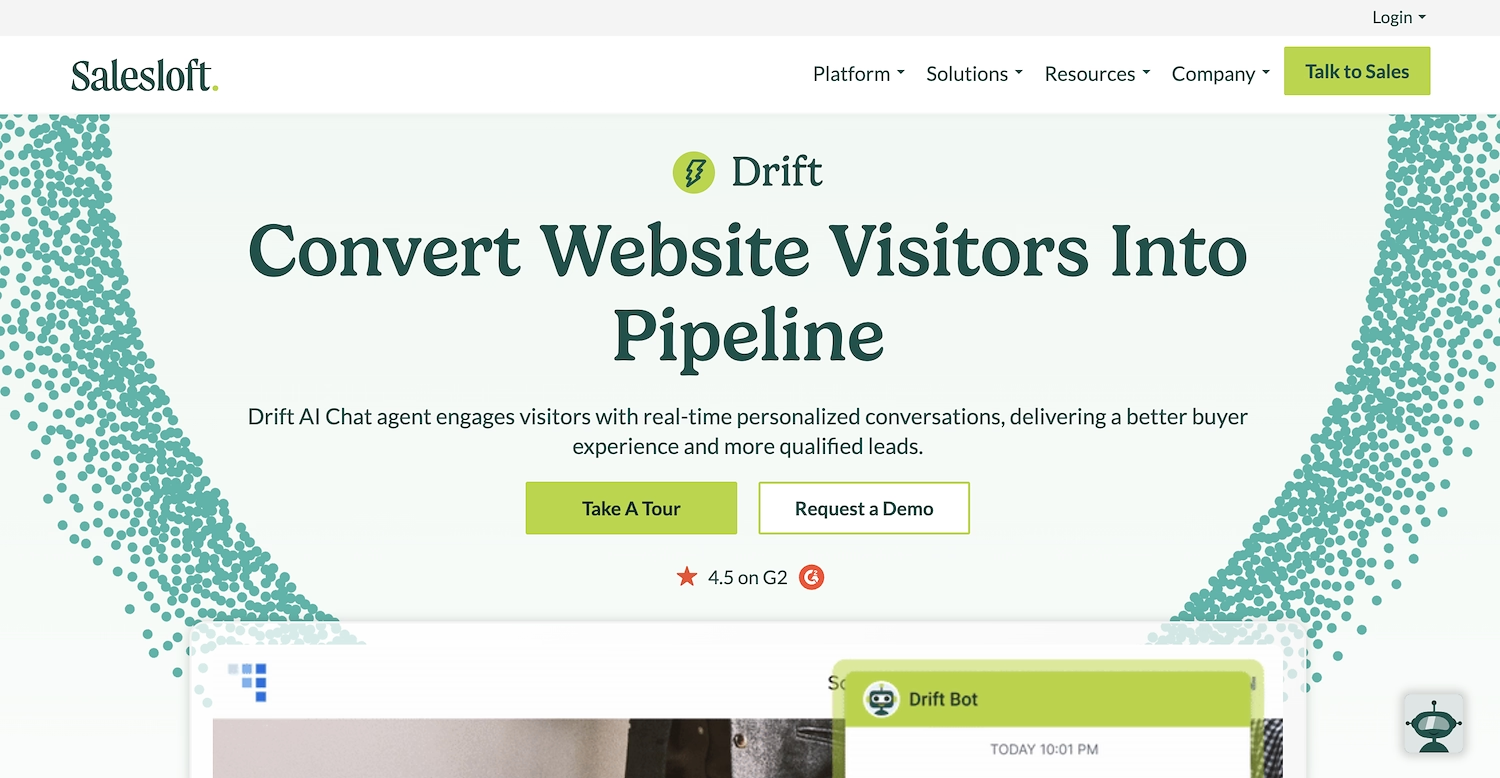
Drift is a platform built to connect businesses with buyers in real time. It uses conversational tools to engage website visitors, qualify leads, and book sales meetings for sales teams.
The system helps identify the best leads from site traffic and gives buyers a direct path to connect with representatives.
Drift's Main Features
- Uses AI chat agents to engage website visitors, answer questions, and book meetings 24/7.
- Engages website visitors with live chat and identifies high-value buyers to let them connect with sales representatives immediately, bypassing forms.
- Identifies anonymous website visitors and uses firmographic data to score their intent and personalize chat conversations.
- Routes qualified buyers and conversation context directly into a seller's workflow for timely follow-up.
How Drift Compares to Edward
Average Review score: 4.4/5 stars based on 1,252 G2 reviews.
- Drift uses AI chat agents to engage website visitors in real time. This is different from Edward, which automates email follow-ups after a lead is already identified.
- The tool qualifies leads directly on the website through conversational chat. Edward, in contrast, focuses on nurturing leads that are already in the system through automated sequences.
- It allows high-intent buyers to book meetings instantly through the chat interface. This provides a more direct path to sales compared to Edward's process, which involves multi-step email outreach.
- This platform identifies anonymous website visitors and personalizes conversations based on their data. This is a proactive engagement feature not found in Edward, which works with known contacts.
Where Drift Falls Short Compared To Edward
- Drift focuses on real-time website chat. It does not offer the automated, multi-step email follow-up sequences that Edward uses to nurture leads over a longer period.
- The platform does not include a dedicated sales forecasting tool. This is different from Edward, which provides a feature to help teams predict future sales performance based on pipeline data.
- Its primary function is to engage visitors on a company's website. This approach is different from Edward, which manages outreach to a list of known contacts and is not limited to website interactions.
Cost Considerations
Drift’s Premium plan starts at $2,500 per month, offering more pricing transparency than Edward’s quote-only model, though higher tiers for both require custom quotes. For the most accurate pricing, we recommend visiting Drift's official website.
Try 11x for Your Sales Team
Teams interested in digital workers for sales can consider 11x. Its autonomous AI agents handle lead generation and outreach to support your sales force. A demo can help determine if the platform is a good fit for your operational goals.
With 11x, AI agents run the sales playbook. Alice finds accounts, enriches data, and handles outreach, while Julian qualifies inbound leads and schedules meetings. The platform unifies the GTM stack, replacing separate tools for data enrichment, outreach, and email warmup.
Book a demo to see the AI agents in action.
6) Outreach
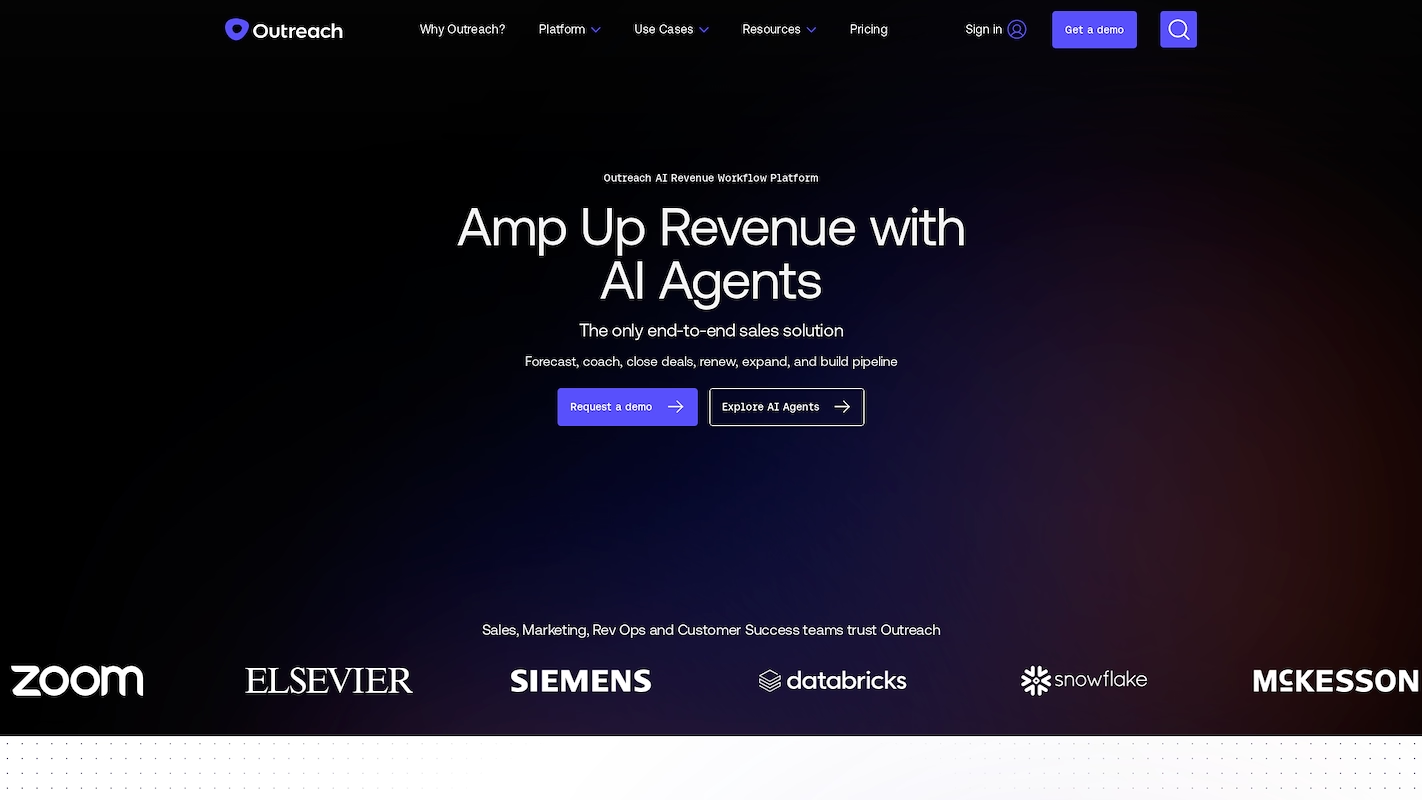
Outreach is a sales execution platform that helps revenue teams manage customer interactions and automate their sales process. The system provides tools to standardize workflows from prospect to close, with data insights to guide sellers and improve productivity.
Outreach's Main Features
- Uses embedded generative AI to automate account research, planning, and message personalization.
- Provides AI-driven coaching for representatives through its Kaia feature, which generates meeting summaries and analytics.
- Detects buyer sentiment and topics across meetings, calls, and emails to provide insights.
- Offers real-time content guidance during live meetings with prompts and content cards from its Kaia assistant.
How Outreach Compares To Edward
Average Review score: 4.3/5 stars based on 3,479 G2 reviews.
- Outreach provides AI-driven coaching for representatives through its Kaia feature. This is a function not present in Edward, which automates tasks but does not analyze performance for training.
- It offers real-time content guidance during live meetings with prompts and content cards. This provides in-the-moment support, unlike Edward, which automates follow-up tasks after a call concludes.
- The tool detects buyer sentiment across various interactions like meetings and emails. This gives deeper insight into a deal's health compared to Edward's sales forecasting, which is based on pipeline data.
- Outreach uses generative AI to automate account research and planning. This is a broader scope of automation than Edward, which concentrates on automating lead follow-up sequences.
Where Outreach Falls Short Compared To Edward
- Outreach is a comprehensive sales execution platform. This can be complex for teams that only need a simple tool for automated lead follow-up, which is Edward's primary focus.
- Some users report occasional issues with the platform's sequencing feature. This is different from Edward, which specializes in reliable, automated follow-up campaigns for lead nurturing.
- The tool's extensive capabilities may sometimes result in slow performance or data sync problems. A more focused solution like Edward might offer a more stable experience for its specific tasks.
Cost Considerations
Outreach uses a quote-based pricing model, similar to Edward, and does not publish its prices. User reviews indicate a high perceived cost, so for the most accurate information, we recommend visiting Outreach's official website to request a custom quote.
7) Apollo.io
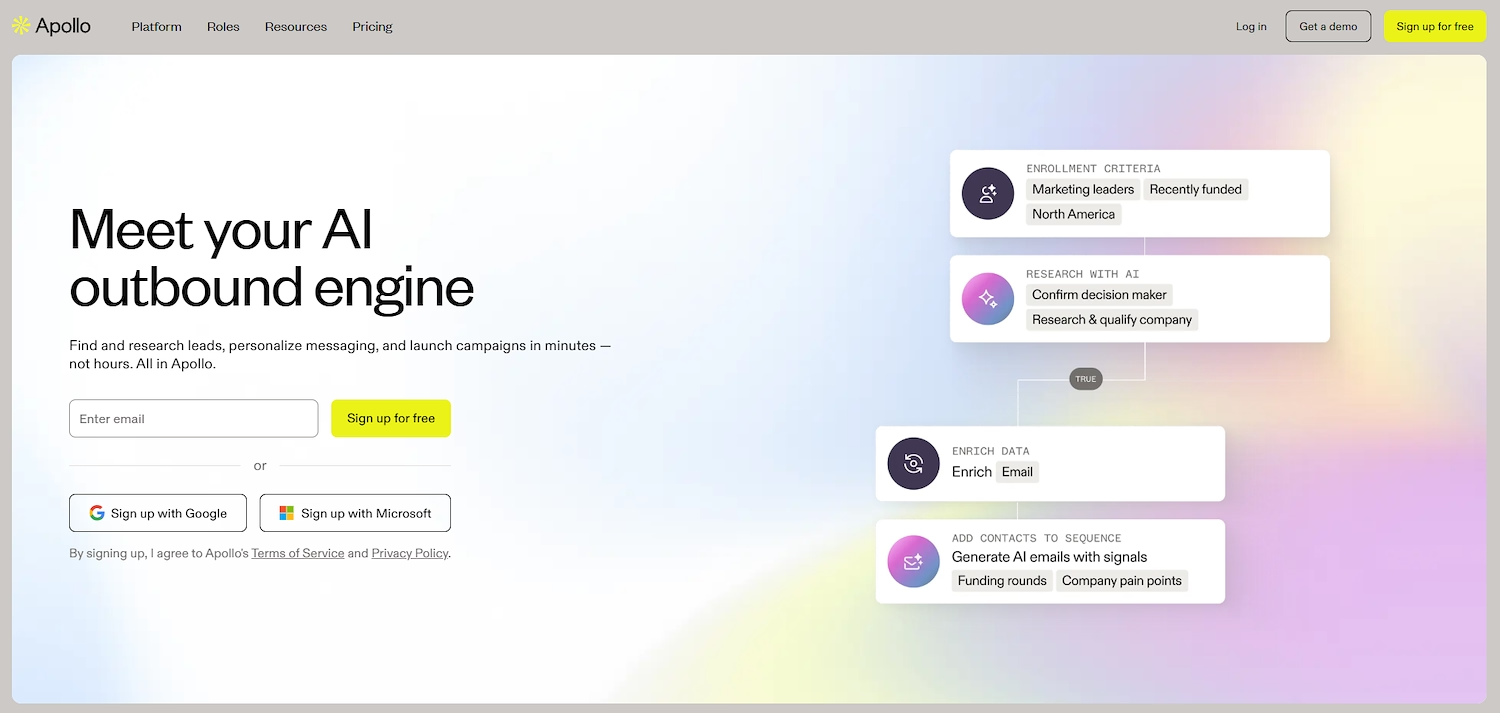
Apollo.io is a sales intelligence and engagement platform. It provides a database of contacts for prospect discovery. Teams can automate outreach with email sequences and use analytics to measure campaign results. The platform also includes tools to score leads and manage sales tasks, which helps organize the workflow.
Apollo.io's Main Features
- Provides a database of contacts for prospect discovery.
- Automates outreach with email sequences and uses analytics to measure campaign results.
- Includes tools to score leads and manage sales tasks to help organize the workflow.
How Apollo.io Compares to Edward
Average Review score: 4.7/5 stars based on 8,904 G2 reviews.
- Apollo.io offers a database of over 210 million contacts to find new prospects. This differs from Edward, which automates follow-ups for a pre-existing list of leads.
- It provides an all-in-one platform for prospecting, outreach, and data enrichment. This contrasts with Edward's more specialized function for sales follow-up and forecasting.
- The tool includes a lead scoring feature to help teams rank potential customers. This provides a different kind of sales insight than Edward's sales forecast tool.
- Users can find prospects and launch outreach campaigns from the same interface. Edward automates outreach for contacts that are already in the sales team's system.
Where Apollo.io Falls Short Compared To Edward
- Apollo.io does not provide a dedicated sales forecasting tool. This is different from Edward, which includes a specific feature to help teams predict future sales performance from their pipeline data.
- Some users report that the platform's contact data can be inaccurate. This may lead to failed outreach attempts, an issue less common with a tool like Edward that works with a sales team's existing contacts.
- The tool's broad feature set can be complex for teams that only need a simple follow-up solution. Edward offers a more focused function for automated outreach, which can be easier to implement for that specific task.
Cost Considerations
Apollo.io offers transparent pricing with a free plan and paid tiers starting at $49 per user per month. This provides more cost predictability and accessibility compared to Edward's quote-only model.
8) Salesloft
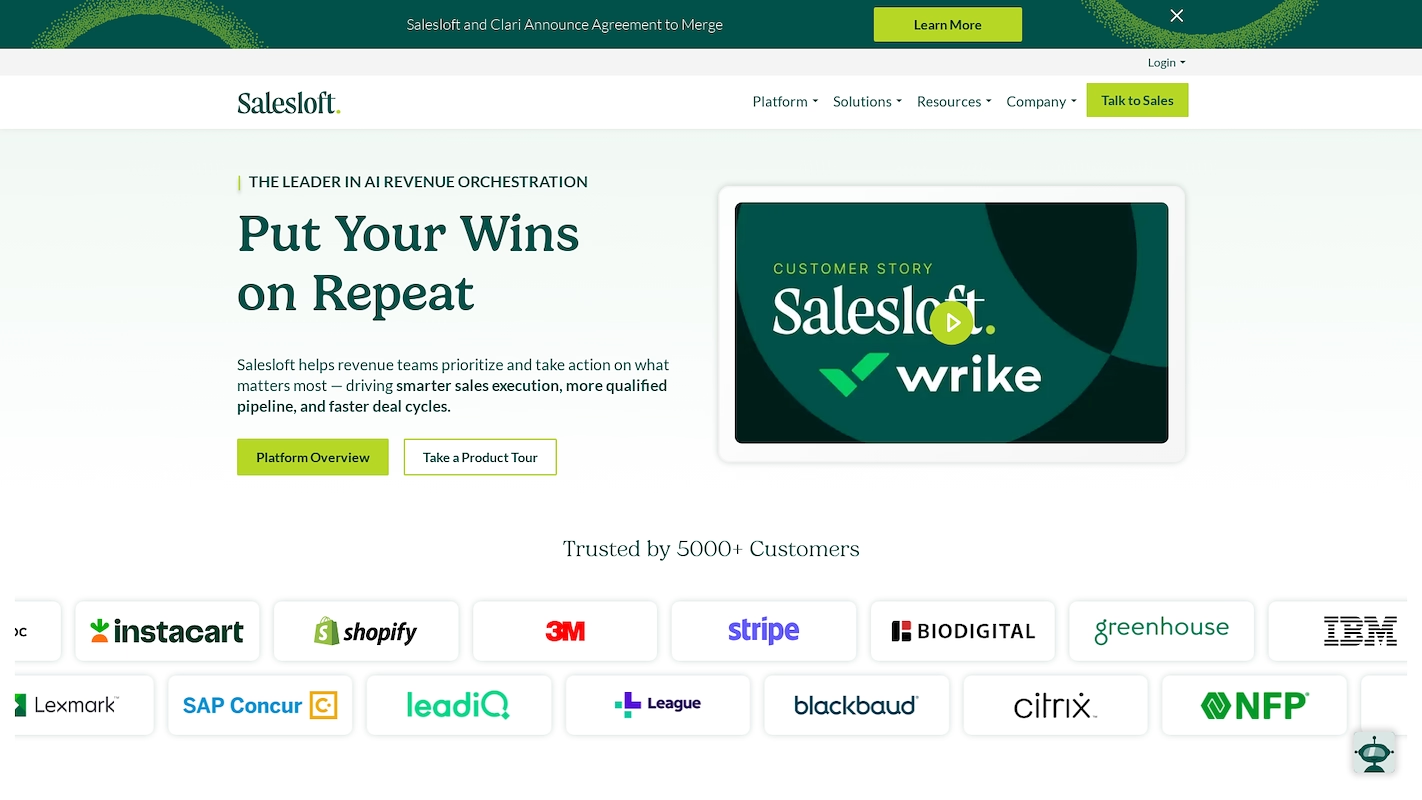
Salesloft is a sales engagement platform that helps revenue teams execute their sales plays. It provides tools for sellers to manage digital communication, track deal progress, and get insights from buyer interactions. The system helps teams build pipeline, manage deals, and engage customers through a structured workflow.
Salesloft's Main Features
- Provides calling capabilities, including click-to-call functionality and call recording.
- Offers analytics to track email open rates, link activity, and attachment interactions.
- Includes personalization tools to customize outreach for individual contacts.
How Salesloft Compares To Edward
Average Review score: 4.5/5 stars based on 4,145 G2 reviews.
- Salesloft provides calling capabilities, including click-to-call and call recording. This differs from Edward, which automates email follow-ups and lacks built-in calling tools.
- It offers analytics to track email open rates and link activity. This gives more granular insight into engagement compared to Edward's focus on automating the follow-up sequence itself.
- The platform includes tools to personalize outreach for individual contacts. This allows for a more tailored approach than Edward's automated follow-up sequences.
- Salesloft uses conversation intelligence from recorded calls to provide coaching insights. Edward does not analyze call content and lacks this coaching function.
Where Salesloft Falls Short Compared To Edward
- Salesloft does not offer a dedicated sales forecasting tool. This is different from Edward, which includes a specific feature to help teams predict future sales performance based on their pipeline.
- The platform’s broad feature set can be complex for teams that only need a simple follow-up solution. Edward provides a more focused function for automated outreach, which can be easier to implement for that specific task.
- While Salesloft automates outreach, it is designed for sellers to manage their own sequences. This is different from Edward, which acts more like an autonomous AI assistant to handle lead follow-up tasks.
Cost Considerations
Salesloft uses a quote-based pricing model, similar to Edward, and does not publish its prices. For the most accurate information, we recommend visiting Salesloft's official website to request a custom quote.
9) Close
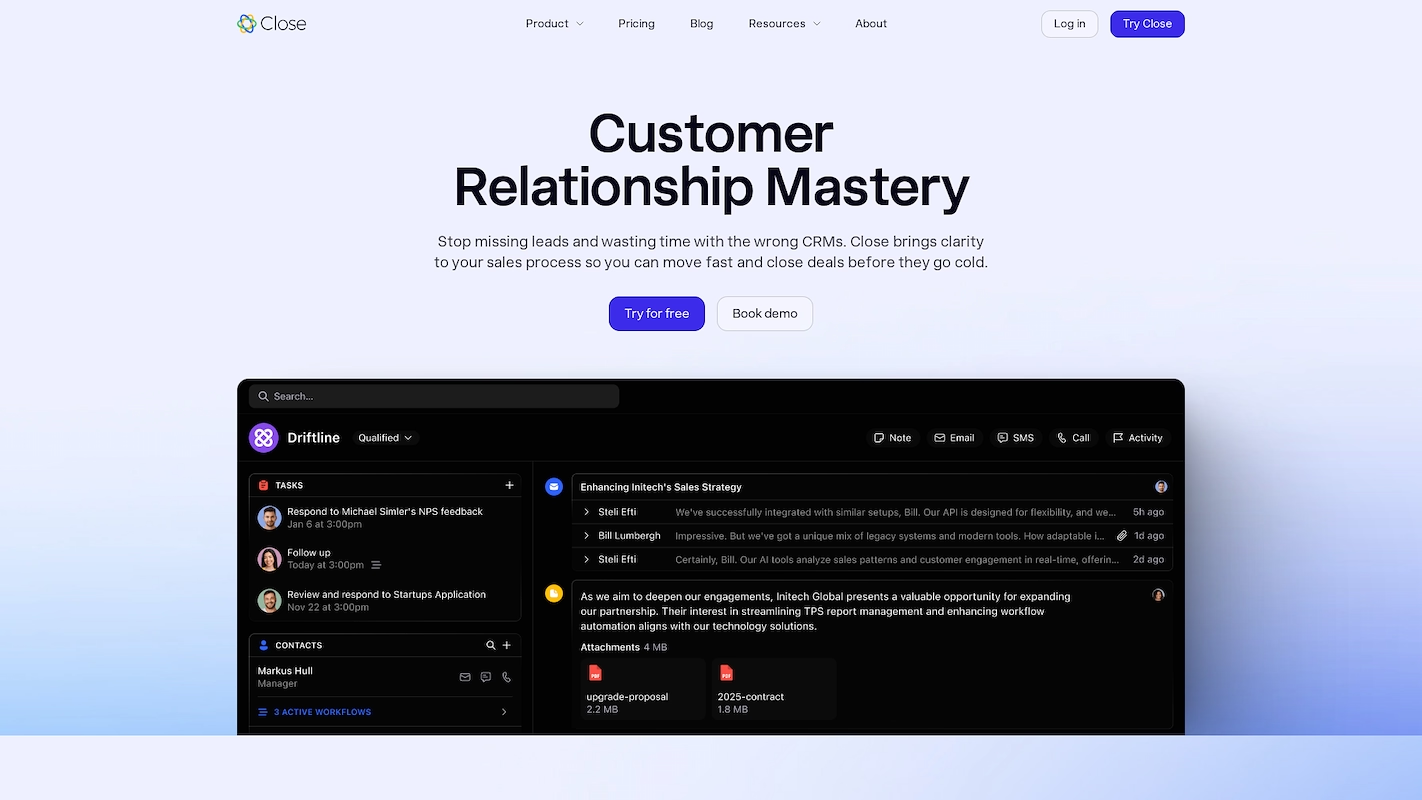
Close is a sales engagement CRM for small and medium businesses. The platform puts calls, email, and SMS into one workspace to help teams manage their pipeline. This approach centralizes communication and sales activities, which allows representatives to focus on lead conversion.
Close's Main Features
- Combines calling, email, and SMS communication tools into a single platform.
- Manages the sales workflow, including contacts, accounts, and the opportunity pipeline.
- Automates marketing tasks with features for campaign and lead management.
- Provides customer support functions such as case management and a knowledge base.
How Close Compares To Edward
Average Review score: 4.7/5 stars based on 1,812 G2 reviews.
- Close provides built-in calling and SMS features within its platform. This is different from Edward, which centers on automating email follow-up sequences and does not include these communication channels.
- It functions as an all-in-one CRM, managing contacts, accounts, and the sales pipeline. This offers a broader scope than Edward, which is a specialized tool for lead follow-up and forecasting.
- The tool includes marketing automation features for campaign and lead management. Edward does not have this capability, as it is designed for sales-specific tasks.
- Close also offers customer support functions like case management and a knowledge base. This is a feature set not found in Edward, which is built for pre-sale activities.
Where Close Falls Short Compared To Edward
- Close does not offer a dedicated sales forecasting tool. This is different from Edward, which includes a specific feature to help teams predict future sales performance based on their pipeline data.
- The platform's automation focuses on tasks within the CRM. It does not function as an autonomous AI assistant for lead follow-up, which is a core capability of Edward.
- As an all-in-one CRM, some users note a learning curve for setup. This contrasts with Edward, which provides a more focused solution for specific sales activities like automated follow-ups.
Cost Considerations
Close offers transparent pricing with plans that start at $9 per user per month. This approach provides more cost predictability than Edward's quote-only model. For teams that need a clear budget, Close's pricing structure is more straightforward.
10) HubSpot Sales Hub
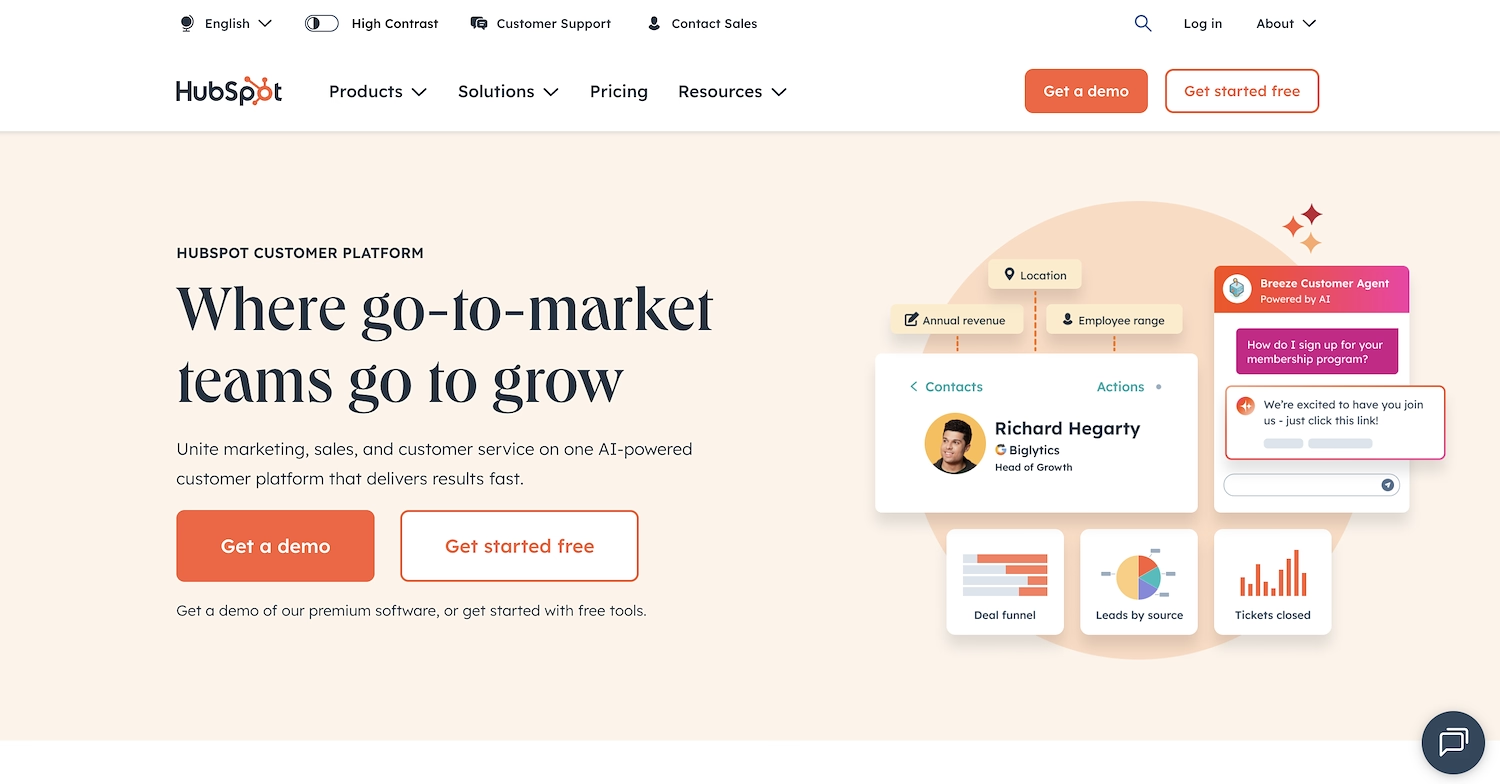
HubSpot Sales Hub is a sales software platform built to increase sales productivity. It provides a suite of tools to help teams manage their pipeline and deepen customer relationships from a single workspace.
The system connects with HubSpot’s marketing and service platforms. This integration offers a complete view of the customer journey and supports a more efficient sales process.
HubSpot Sales Hub's Main Features
- Manages contacts, accounts, and the opportunity pipeline with sales force automation.
- Includes marketing automation tools for email marketing and campaign management.
- Provides customer support functions, including case management.
- Offers mobile user support and social collaboration features.
How HubSpot Sales Hub Compares To Edward
Average Review score: 4.4/5 stars based on 12,407 G2 reviews.
- HubSpot Sales Hub includes marketing automation tools for email marketing and campaign management. This is different from Edward, which focuses on sales-specific tasks like lead follow-up.
- The platform provides customer support functions, such as case management. This extends its use beyond the pre-sale activities that Edward handles.
- It functions as a full sales CRM, managing contacts, accounts, and the opportunity pipeline in one place. Edward, in contrast, is a specialized tool for specific sales activities.
- This tool offers mobile user support, allowing teams to manage sales activities on the go, a feature not specified for Edward.
Where HubSpot Sales Hub Falls Short
- HubSpot Sales Hub does not offer a dedicated sales forecasting tool. This contrasts with Edward, which provides a specific function to help teams predict future sales performance from their pipeline.
- The tool functions as a broad sales platform for representatives to manage tasks. It does not operate as an autonomous AI assistant for lead follow-up, which is a primary capability of Edward.
- Its nature as an all-in-one platform can introduce complexity for teams that only need a simple follow-up tool. Edward provides a more focused solution for automated outreach, which can be simpler to implement for that single purpose.
Cost and Budget Considerations
HubSpot Sales Hub offers transparent pricing with a free plan and paid tiers starting at $20 per user per month. This provides more cost predictability than Edward’s quote-only model. For the most accurate pricing on higher-tier plans, visit the HubSpot Sales Hub's official website.
Which One Should You Go With?
Choosing the right Edward alternative depends on your team's specific needs and priorities. This guide reviewed several options to provide a basis for your decision-making process.
For teams looking to augment their sales operations, 11x offers autonomous AI agents that manage complex tasks like lead generation and outreach. This approach can replace multiple point solutions and unify your go-to-market stack.




